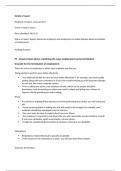Details of report
Recipient of report: Local Law Firm
Issuer of report: Laura …
Date submitted: 26.05.23
Status of report: Report about how employers and employees can settle disputes about termination
of employment.
Findings/Content
P5 - Present client advice, explaining the ways employment can be terminated.
Grounds for the termination of employment
There are a few circumstances in which your employer may fire you:
Being unable to perform your duties effectively
You might not be able to carry out your duties effectively if, for example, you have trouble
getting along with your coworkers or if you have trouble keeping up with important changes
to your job, like a new computer system.
Prior to taking any action, your employer should: adhere to the proper discipline
procedures, such as warning you when your work is subpar and giving you a chance to
improve, like by providing you with training.
Illness
If a chronic or ongoing illness prevents you from performing your duties, you risk losing your
job.
If your current position is making you sick and needs to be changed, for example, your
employer should first investigate ways to help you.
Give your body the time it needs to heal from your illness.
Your employer is required by law to provide you with reasonable accommodations at work
if you have a disability, which may include a chronic illness.
It might be considered discrimination if someone is fired due to a disability.
Redundancy
Redundancy-related dismissal is typically acceptable.
If the reason for the redundancy is unfair, you will have been fired unfairly.
Summary termination
, If you don't adhere to the established disciplinary procedures, your employer may fire you
for "gross misconduct." This might occur, for instance, if you are abusive toward a customer,
a coworker, or property.
Your employer should always conduct an investigation before taking any further action, even
if there is a chance for serious misconduct.
a "statutory restriction"
If continuing to employ you would result in breaking the law, for example, if you lost your
driving privileges while working as a driver for a truck company, you might be fired.
It is impossible to continue working with you.
It's probably fair if it's impossible to keep you on staff. For instance, if a factory burns down
and nobody can be hired as a result.
"Substantial justification"
For instance, you might be fired fairly if you irrationally reject a company restructure that
modifies your employment terms.
You're brought to jail.
Before determining whether the dismissal was reasonable in any given situation, a tribunal
will always establish a potentially fair reason. In essence, there are two things to take into
account.
Case Studies
Case Study 1: Because of the stress his new boss is causing him, Peter is considering quitting his job.
If Peter's manager cannot persuade him to stay, he must accept his resignation. If Peter becomes
seriously ill as a result of stress, he can take time off and still be paid, but he must return once he is
fit to work again. If he quits, his employer will continue to pay him until a certain point, after which
he will be officially laid off and must begin looking for new work.
Case Study 2: Mary's employer has informed her that her job, as well as the jobs of the other 449
employees, will be terminated. Her boss has told her to clear her desk and leave the building
immediately, effectively putting her out of work. If an employer intends to lay off employees, they
must provide them with notice before their employment ends. Employees who have worked for the
company for one month to two years usually have a one-week notice period. For every two to
twelve years of service, employees receive a one-week pay period. When an employee leaves a
company after ten years, the employer is required to give at least ten weeks' notice. Mary was
subjected to illegal treatment, and her employer broke the law by only providing her with a brief
notice. She has every right to go to court and sue her employer.
Case Study 3: After becoming tired of James' attitude at work, his employer fired him right away. His
boss verbally chastises him for being consistently late, telling him that he needs to improve. He has a
bad attitude at work. He was late for the meeting because he was too lazy to get up early. His
manager, however, did not properly fire him. Although his manager has every right to fire him for
having a bad attitude, he must first follow a set of rules, such as issuing a warning about his conduct
and punctuality. This does not include speaking with his boss; rather, he must receive a formal
written warning. Despite the fact that James clearly does not want to work for the company and has




